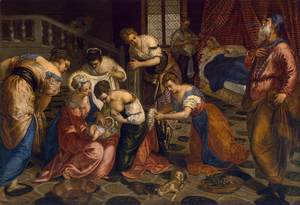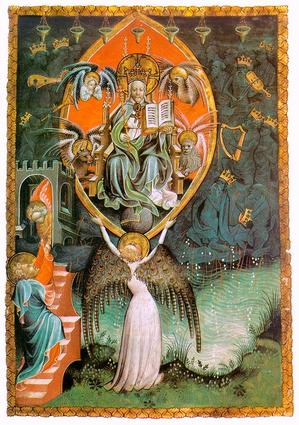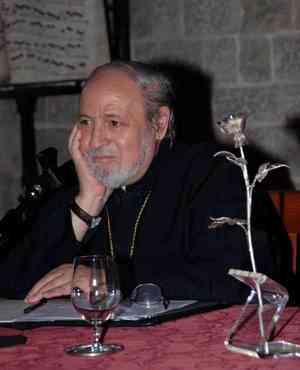 On 22 September 2010, a giant in the world of
On 22 September 2010, a giant in the world of
ecumenism and Eastern Christianity died after living with illness. No one can
doubt the sentiment expressed by the Pope saying that Monsignor Fortino had a “generous
commitment with intelligence and passion at the service of unity.” The Pope
last saw Monsignor Fortino on June 28 with the delegation of the Ecumenical
Patriarch Bartholomew I. A telegram was sent through his secretary of state,
Cardinal Tarcisio Bertone, honoring the life of the undersecretary (third in
charge) of the Pontifical Council for Promoting Christian Unity, who focused
particularly on relations with the Orthodox Churches.
Category: Eastern Church
Meeting the new rector at the Pontifical Oriental Institute
In May, the announcement of a new rector was made that the Pontifical Oriental Institute in Rome, a Jesuit work for the universal Church, Jesuit Father James McCann. The new rector is a member of the Chicago Province of Jesuits, is 61 years old and was ordained a priest in 1979.
Conception of Saint the Baptist
Rejoice, O
barren one, who had not given birth; for the behold you have conceived clearly
the one who is the dawn of eh Sun Who was about illuminate the whole universe,
blighted with sightlessness. Shout in joy, O Zachary, crying in favor, truly,
the one to be born is a Prophet of the High. (Troparion, 4th tone)
On the
Byzantine liturgical calendar, today is the feast of the Conception of Saint
John the Baptist. The Eastern Church, at least the Churches with a Greek
origin, keeps three conception feasts: Our Lord (March 25), Our Lady
(December 9) and the Baptist (September 23). The Latin Church only keeps two.
Calendar study will tell you that
only the Savior has a perfect 9-month gestation period; Our Lady is a day under
(September 8) and the Baptist, a day under (June 24). The liturgical calendar of
the Latin Church places the conception of Mary on December 8, the feast of the
Immaculate Conception of the Blessed Virgin Mary.
The theology for today’s feast is rooted in the biblical
narrative of Zachary and Elizabeth, a couple who had no children and therefore
in the eyes of the world plagued by divine disfavor. All of their lives Zachary
and Elizabeth begged God to send them a son. Providence heard their prayer and in His plan and mercy for
all, ordained that the dawn of salvation would be effected by the birth of John
through the agency of the barren Elizabeth. The Church calls John the Prophet
and Forerunner of Jesus, the Savior of the world.
Other significant divinely merciful
births to barren women who are a significant part of the Divine Plan of Salvation are Isaac son of Sarah and Samson born to the wife
of Manoah (Samson’s mother is not named in Scripture).
Archbishop Francis Mansour Zayek, RIP
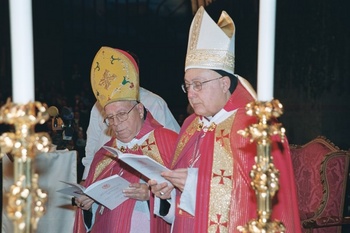 With great sadness word was received today of the passing to the Lord of His Excellency, Archbishop Francis Mansour Zayek, 90, emeritus archbishop of the Eparchy of Saint Maron of Brooklyn, on the 14 September 2010, the Exaltation of the Holy Cross.
With great sadness word was received today of the passing to the Lord of His Excellency, Archbishop Francis Mansour Zayek, 90, emeritus archbishop of the Eparchy of Saint Maron of Brooklyn, on the 14 September 2010, the Exaltation of the Holy Cross.
The fate of Eastern Christianity to be discussed in October; but what about now?
The hard work of collaborating and witnessing to Jesus Christ for 14 million Eastern Christians is indeed a difficult task, but one that is only sustained by prayer, mutuality and study.
Liturgical New Year for the Byzantine Church
Happy New Liturgical Year for the Byzantine Church! Have a blessed 7519!!! The Byzantine Church understands this date to be the years since the creation of the world. A new liturgical year, a new beginning to give God glory, honor and praise!!!!
Fr Robert Taft advocates ecumenical scholarship & theology as a new approach to restore communion among the churches of East and West
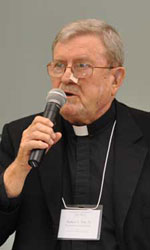 The
The
Roman Catholic and Eastern Orthodox churches should own up to their
past misdeeds and work to restore communion, according to Archimandrite Robert F.
Taft, SJ.
Fr. Taft, a Jesuit priest of the New England Province and professor emeritus of the history of Byzantine Liturgy at the Pontifical
Oriental Institute in Rome, said that the rift between the churches was
sustained primarily by offensive actions–not theological differences.
He delivered “Perceptions and Realities in Orthodox-Catholic Relations
Today,” on June 28 at Fordham University.
“The main problem that we Catholics and Orthodox face in our ecumenical
dialogue is not doctrine but behavior,” Fr. Taft said. “The issue is
not that Catholics and Orthodox do not know how to pray and believe and
live Christianity in the right and true apostolic way. The problem is
that we do not know how to act.”
He
pointed to Catholic “uniatism”–aggression against another church–as a
major problem blocking fruitful dialogue between the religions. He
added that although the Orthodox faith has been victimized, it also
refuses to admit its own misdeeds.
Fr. Taft advocated a system of “ecumenical scholarship and theology”–a
new way to study Christian tradition that seeks to reconcile and unite,
rather than to confute and dominate. To accomplish this, the Catholic
and Orthodox churches must recognize one another as historic apostolic
sister churches, he said.
The
point of this new ecumenical theology is not that Catholics and
Orthodox never disagree. “What it does mean, is that at the official
level, disagreements can be discussed truthfully and courteously,
without invective, rudeness, and slander,” Fr. Taft said. [Fordham
University]
Praying the Maronite Liturgy
Today, I was one of the acolytes at St Ann Melkite Church (Waterford, CT) for the Maronite Liturgy celebrated in the another Eastern Church, the Melkite Church. It is not typical for one Liturgy to be celebrated in a church of another Eastern Church but since there are a number of Maronite Catholics who live in southeastern Connecticut it was judged rightly to have the Maronite Liturgy this weekend. The Liturgy was done in both English and Arabic. My friend Archimandrite Edward Kakaty welcomed visiting Maronites with their priest from Our Lady of Lebanon Church, Waterbury, CT, to St Ann’s.
Basil M. Schott, OFM, Ruthenian metropolitan archbishop RIP
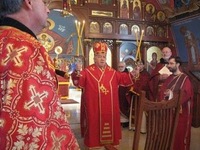 After struggling with Leukemia Metropolitan Basil Myron Schott, OFM, died this morning. He was 71. I have fond memories of meeting the archbishop and always found him to be a kind and holy man.
After struggling with Leukemia Metropolitan Basil Myron Schott, OFM, died this morning. He was 71. I have fond memories of meeting the archbishop and always found him to be a kind and holy man.
Saint Ephrem the Syrian
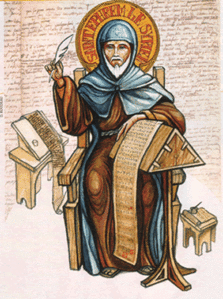 It is indeed fitting to honor the blessed deacon of
It is indeed fitting to honor the blessed deacon of
Edessa for his desire that the preaching of the divine word and the training of
his disciples rest on the purity of Sacred Scripture. He also acquired honor as
a Christian musician and poet. He was so accomplished in both arts that he was
called the “lyre of the Holy Spirit.” From this, Venerable Brothers,
you can learn what arts promote the knowledge of sacred things. Ephrem lived
among people whose nature was attracted by the sweetness of poetry and music.
The heretics of the second century after Christ used these same allurements to
skillfully disseminate their errors. Therefore Ephrem, like youthful David
killing the giant Goliath with his own sword, opposed art with art and clothed
Catholic doctrine in melody and rhythm. These he diligently taught to boys and
girls, so that eventually all the people learned them. In this fashion he not
only renewed the education of the faithful in Christian doctrine and supported
their piety with the spirit of the sacred liturgy, but also happily kept
creeping heresy at bay.
to sacred matters as Theodoretus stresses. The metric rhythm, which our saint
popularized, was widely propagated both among the Greeks and the Latins. Indeed
does it seem probable that the liturgical antiphonary with its songs and
processions, introduced at Constantinople in the works of Chrysostom and at
Milan by Ambrose (whence it spread throughout all of Italy), was the work of
some other author? For the “custom of Eastern rhythm” deeply moved
the catechumen Augustine in northern Italy; Gregory the Great improved it and
we use it in a more advanced form. Critics acknowledge that that “same
Eastern rhythm” had it origins in Ephrem’s Syrian antiphonary.
wonder then that many of the Fathers of the Church stress the authority of St.
Ephrem. Nyssenus says of his writings, “Studying the Old and New
Scriptures most thoroughly, he interpreted them accurately, word for word; and
what was hidden and concealed, from the very creation of the world to the last
book of grace, he illumined with commentaries, using the light of the
Spirit.” And Chrysostom: “The great Ephrem is scourge of the
slothful, consoler of the afflicted, educator, instructor and exhorter of
youth, mirror of monks, leader of penitents, goad and sting of heretics,
reservoir of virtues, and the home and lodging of the Holy Spirit.” Certainly
nothing greater can be said in praise of a man who, however, seemed so small in
his own eyes that he claimed to be the least of all and a most vile sinner”
(12-14).
Pope Benedict XV
Principi
Apostolorum Petro (On St. Ephrem the Syrian), 5 October 1920
